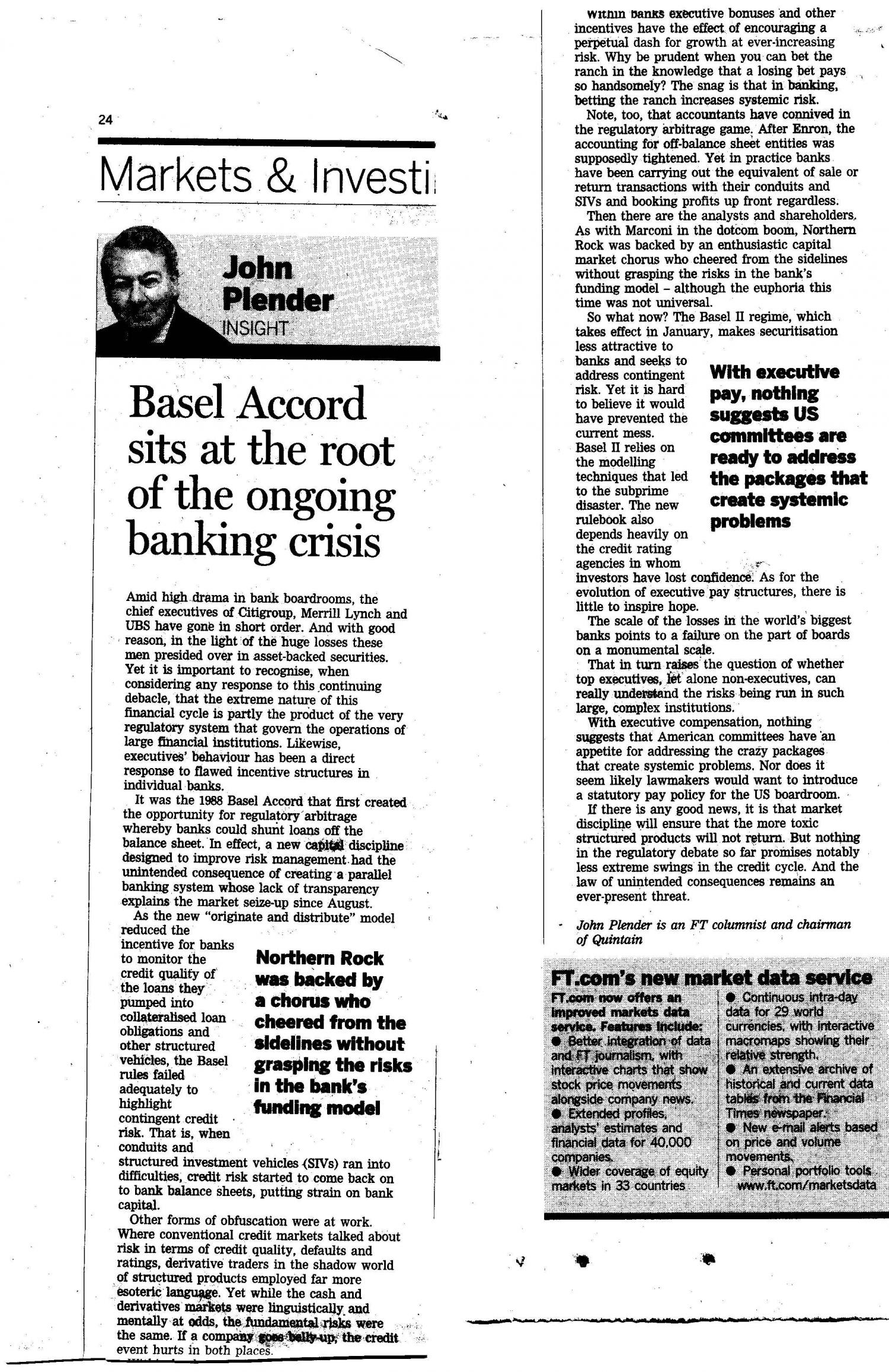
Market insight: Basel is the root of the banking crisis
By John Plender
Published: November 6 2007 17:39 | Last updated: November 6 2007 17:39
Amid high drama in bank boardrooms, the chief executives of Citigroup, Merrill Lynch and UBS have gone in short order. And with good reason, in the light of the huge losses these men presided over in asset-backed securities.
Yet it is important to recognise, when considering any response to this continuing debacle, that the extreme nature of this financial cycle is partly the product of the very regulatory systems that govern the operations of large financial institutions. Likewise, executives’ behaviour has been a direct response to flawed incentive structures in individual banks.
It was the 1988 Basel Accord that first created the opportunity for regulatory arbitrage whereby banks could shunt loans off the balance sheet. In effect, a new capital discipline designed to improve risk management had the unintended consequence of creating a parallel banking system whose lack of transparency explains the market seize-up since August.
As the new “originate and distribute” model reduced the incentive for banks to monitor the credit quality of the loans they pumped into collateralised loan obligations and other structured vehicles, the Basel rules failed adequately to highlight contingent credit risk. That is, when conduits and structured investment vehicles (SIVs) ran into difficulties, credit risk started to come back on to bank balance sheets, putting strain on bank capital.
Other forms of obfuscation were at work. Where conventional credit markets talked about risk in terms of credit quality, defaults and ratings, derivative traders in the shadow world of structured products employed far more esoteric language. Yet while the cash and derivatives markets were linguistically and mentally at odds, the fundamental risks were the same. If a company goes belly-up, the credit event hurts in both places.
Within banks executive bonuses and other incentives have the effect of encouraging a perpetual dash for growth at ever-increasing risk. Why be prudent when you can bet the ranch in the knowledge that a losing bet pays so handsomely? The snag is that in banking, betting the ranch increases systemic risk.
Note, too, that accountants have connived in the regulatory arbitrage game. After Enron, the accounting for off-balance sheet entities was supposedly tightened. Yet in practice banks have been carrying out the equivalent of sale or return transactions with their conduits and SIVs and booking profits up front regardless.
Then there are the analysts and shareholders. As with Marconi in the dotcom boom, Northern Rock was backed by an enthusiastic capital market chorus who cheered from the sidelines without grasping the risks in the bank’s funding model – although the euphoria this time was not universal.
So what now? The Basel II regime, which takes effect in January, makes securitisation less attractive to banks and seeks to address contingent risk. Yet it is hard to believe it would have prevented the current mess. Basel II relies on the modelling techniques that led to the subprime disaster. The new rulebook also depends heavily on the credit rating agencies in whom investors have lost confidence.
As for the evolution of executive pay structures, there is little to inspire hope. The scale of the losses in the world’s biggest banks points to a failure on the part of bank boards on a monumental scale. That in turn raises the question of whether top executives, let alone non-executives, can really understand the risks being run in such large, complex institutions.
With executive compensation, nothing suggests that American committees have an appetite for addressing the crazy packages that create systemic problems. Nor does it seem likely that lawmakers would want to introduce a statutory pay policy for the US boardroom.
If there is any good news, it is that market discipline will ensure that the more toxic structured products will not return. But nothing in the regulatory debate so far promises notably less extreme swings in the credit cycle. And the law of unintended consequences remains an ever-present threat.
John Plender is an FT columnist and chairman of Quintain
Copyright The Financial Times Limited 2011. You may share using our article tools. Please don't cut articles from FT.com and redistribute by email or post to the web.
